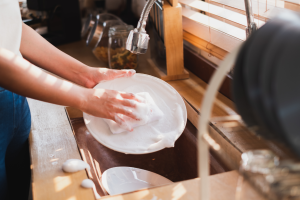Explaining the Connection Between Hard Water and Soap Suds: Insights from a Pentair Water Softening Company in Villa Park, Illinois

One of the main issues you’ll face when dealing with hard water is that it’s difficult to create soap suds. Put simply, hard water and soap don’t mix — at least not well. This is why, if you want to be able to produce an optimal amount of suds in your Villa Park home, you’ll need to have a water softener installed.
Are you interested in learning about the connection between hard water and soap suds, and how a water softener can make a difference? This Pentair water softening company in Villa Park, Illinois is going to discuss some of the key things you should know below.
The Connection Between Hard Water and Soap Suds
We’ve mentioned that hard water inhibits the production of soap suds. What you might be wondering, though, is how? What’s the specific connection between the two?
When water and soap contact one another, a chemical reaction occurs. This chemical reaction results in the creation of suds. However, when water is hard and filled with copious amounts of calcium and magnesium, the typical chemical reaction between the soap and water can’t occur. The calcium and magnesium essentially prevent it from happening (or reduce it, at the very least).
This is why, if you want to produce the most soap suds possible, you’ll need to remove the calcium and magnesium from your water. This is where a Pentair water softening company in Villa Park, Illinois can help.
How the Water Softener Removes Calcium and Magnesium from Water
Now that we’ve mentioned the role of hard water in inhibiting suds production, and now that we’ve discussed the need for a water softener in producing optimal suds, let’s discuss how the water softener goes about removing calcium and magnesium from a water supply.
The water softener facilitates this through a process known as ion exchange. This is when positively charged ions are traded for negatively charged ions. When it comes to the water softener, sodium ions are traded for calcium and magnesium ions.
Within the water softener is a collection of resin beads. These beads are loaded with sodium ions. When hard water passes through the water softener, the sodium ions leave the resin beads, leaving room for calcium and magnesium to latch onto those beads instead.
By the time the water has exited the water softener, it’s entirely void of calcium and magnesium particles. It does contain trace amounts of sodium. However, it’s such a small amount that it registers no discernible difference in the water’s quality.
Now that the water is free of calcium and magnesium particles, it can facilitate a full chemical reaction when mixed with soap. In other words, it can create the optimal number of soap suds.
When you have the optimal number of soap suds, you’re going to have an extremely easy time cleaning. You’ll also get the absolute most out of your soap, saving you time, money, and energy.
All you’ll have to do to keep the process rolling is to fill your water softener with softener salt every few months. Do this consistently, and you’ll never have to worry about a lack of suds ever again. If you need help with this task, you can always reach out to a reputable Pentair water softening company in Villa Park.
Looking for a Pentair Water Softening Company in Villa Park, Illinois?
Are you ready to install a water softener? Looking for the most trusted Pentair water softening company in Villa Park, Illinois? If so, our team at Johnson Water Conditioning would be happy to assist you.
We have installed water softeners in all types of properties throughout the Villa Park area over the years. Our friendly and experienced team looks forward to helping you. Contact us now to get the process started.

 Better Water for
a Better Life
Better Water for
a Better Life
